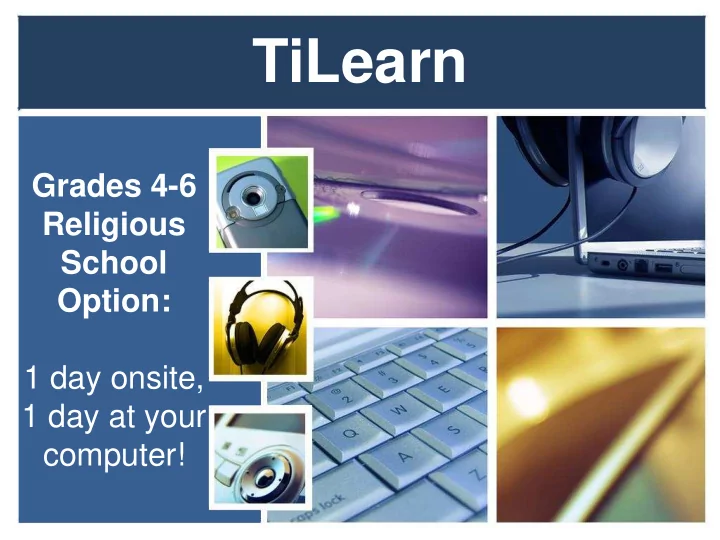

TiLearn Grades 4-6 Religious School Option: 1 day onsite, 1 day at your computer!
Why TiLearn? • Families looking for greater flexibility because of a conflict with Monday afternoons. • Can log on from any computer (preferred) or handheld device with Internet access • Students who learn better in the comfort of home or with the use of the technology
Why do kids like TiLearn? Encourages critical-thinking, creativity, and effective communication skills. Technology helps make Judaism accessible and relevant to student and families . Helps to inspire passionate, personal responsibility for learning. Provides access to learning anytime and anywhere for continuous learning.
How Does TiLearn Work? TiLearn requires a two-day commitment : • Sundays at your computer (9:00am-10:15am) • Wednesdays at TI 4:15pm-5:45pm While technology is integral to TiLearn , we feel strongly that on-site learning on Wednesday is essential to building an in-person community and developing a familiarity with our temple and the Sanctuary. Therefore, students are expected to participate in both days.
TiLearn: benefits to this learning model • Different approaches to learning: multimedia resources, breakout groups, virtual whiteboards, etc. • Web-based meeting software that integrates our beloved values- based curriculum • Ideal for students who prefer to work in quiet space without interruptions and distractions • Students are able to respond after taking time to think about their response to a question: They can say it aloud or type it and see it before pressing “Enter”
Comparing TiLearn & Traditional Models Category TiLearn Traditional Days & Times Sun, 9-10:15 am Mon & Wed, Wed, 4:15-5:45pm 4:15-5:45pm Locations Sun at home Mon & Wed at TI Wed at TI Number of 55-56 55-56 Class Sessions Use of Technology Student/parent should be In-classroom resources comfortable using technology facilitated by teacher Ideal Personality Types Self-motivated, more Motivated by hands-on learning comfortable in an individual activities with peers, learning environment, appreciates face-to-face appreciates a quiet setting interactions Community Virtual and in-person In-person only Hebrew Learning Requires more self-study More time for face-to-face (i.e., review and practice at study and review with peers home using online resources) and teacher
ShalomLearning: Our Curriculum • Same 7 values students explored as third graders, but addressed in new, age-appropriate ways each year. • Same material that students in the traditional model cover. • Customized homepage allows students to access all classroom materials for reference later on.
ShalomLearning: About the new Curriculum and Demonstration lesson
Our values-based curriculum builds character and a strong Jewish identity Teshuvah . Taking responsibility for our actions. B’Tzelem Elohim . Honoring the image of God in ourselves and others. Gevurah . Using one’s inner strength to do what’s right. Achrayut . Doing what you can to make the world a better place. Hakarat HaTov . Seeking joy and being grateful. Koach HaDibbur . The power of words. Shalom . Helping to create a more peaceful world.
Gevurah 5 th Grade Virtual Class
Class Outline Recap of Family Havurah Video: Standing up for Red BRAIN BREAK! Gevurot Wrap-Up
Weekly Recap Havurah - What is Peer Pressure? Activities- Lights: Miracle of Chanukah Discussions - People who use spiritual strength Can you think of a time this week when you demonstrated spiritual gevurah ?
Standing Up VaYikra 19:16: “Do not stand idly by while your neighbor’s blood is shed.” "From where do we learn that if you are in a position to offer testimony on someone’s behalf, you are not permitted to remain silent? From "Do not stand idly by while your neighbor's blood is shed." – Sifra Leviticus on 19:16
What are the risks? What do you think are the risks of speaking out? What are some things you can do to prevent some of these risks?
Example from your life Can you think of a time when you spoke up when the group you were with was making poor decisions? A time when you wished you had spoken up when the group you were with was involved in bad behavior? Have you ever spoken up at a cost to your reputation or safety? Has anyone spoken up for you before?
Video: Standing up for Red Watch this video
Reflection How did that video make you feel? Why? Think about what you would have said to intervene when the bus driver was being bullied. Write your answer in the chat box. Which of your classmates’ responses do you think would have been most effective?
Video: Standing up for Red Where did you see Gevurah in this video? Was it physical Gevurah? Inner Gevurah? What are other ways the older boy could have stood up to the bullies for Red?
BRAIN BREAK! Chazak by Dan Nichols 1. Stand Up 2. Every time you hear the word , make a muscle with your right arm. 3. Every time you hear the word “strong” make a muscle with your left arm. 4. Every time you hear the phrase , jump up and down.
Gevurot
Wrap-Up What are some ways to use your inner Gevurah? Name one thing you want to do next time you see someone being bullied. Write it in the chat box. Next Week’s Self Study: Biographies of Courageous American Jews This week, you should think about: When you disagree with another person’s behavior or point of view, what should you do? Are there good ways and bad ways to argue?
Recommend
More recommend